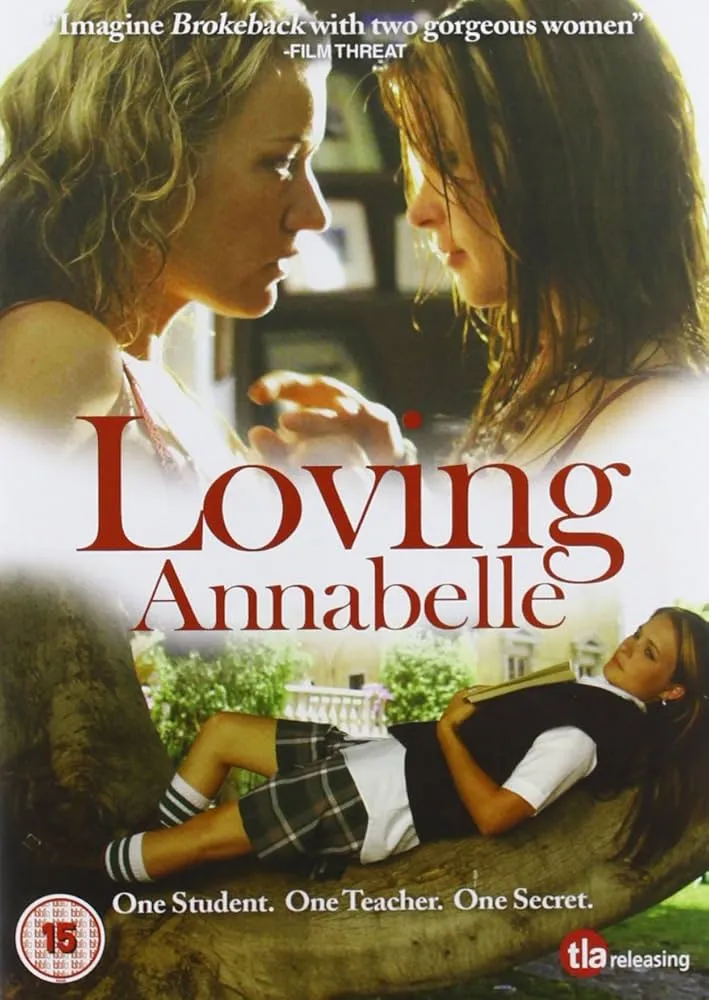Loving Annabelle (2006)
Loving Annabelle (2006), directed by Kristen Ashley, is a deeply emotional and controversial film that delves into the complexities of love, sexuality, and forbidden attraction. The story takes place at a strict Catholic boarding school for girls, where Annabelle (Diana DeGarmo), a rebellious and intelligent teenager, is sent after causing trouble in her previous school. Annabelle is an outcast who struggles with her identity, finding herself at odds with the traditional expectations of femininity and the societal norms of the time. She is an eager learner with a passion for literature and philosophy, but her emotional life is marked by confusion and a growing awareness of her sexuality. Enter Simone (Patricia Velasquez), a new and charismatic teacher at the school. Simone is initially distant and reserved, but she is soon drawn to Annabelle's unique personality and sharp intellect. The chemistry between them is immediate, but it also creates an overwhelming sense of conflict, as both women become aware of the boundaries they cannot cross. While Simone remains professional and detached, Annabelle begins to develop a deep emotional and physical attraction to her teacher, creating a tension that becomes harder to ignore. As the story progresses, the connection between Annabelle and Simone deepens into an undeniable bond, marked by both emotional intimacy and subtle physical interactions. Annabelle, in her search for identity and love, pushes the boundaries, relentlessly pursuing her teacher, who is struggling with her growing feelings. Simone finds herself torn between her responsibilities as a teacher and her undeniable attraction to Annabelle. The film showcases the inner turmoil both women face: Annabelle’s desire for a love she has never experienced, and Simone’s moral and professional conflict about the inappropriate nature of their relationship. Their moments of closeness are fraught with the weight of what cannot be, yet they cannot completely resist the powerful pull between them. Simone tries to maintain her distance, understanding the risks involved, but Annabelle’s persistent advances and emotional openness make it increasingly difficult for her to keep her composure. The film paints a complex picture of forbidden love, exploring the boundaries between innocence, desire, and the consequences of acting on those feelings within the confines of a rigid society that cannot accept their relationship.

In the film's final act, the intensity of the relationship reaches a breaking point. Simone, who has been struggling to resist her emotions, ultimately makes the heart-wrenching decision to sever the connection with Annabelle. The weight of the consequences—both legal and emotional—becomes too great for Simone to bear. She realizes that continuing the relationship would not only destroy her career but also harm Annabelle’s future. As the love affair ends, both women are left devastated by the separation. Annabelle is heartbroken, as she had given herself entirely to the relationship, believing it could be a way for her to understand her own identity and love. Simone, though she knows the right choice was to end it, is equally torn, as her feelings for Annabelle were genuine and intense. The film closes on a poignant and tragic note, with both characters moving on with their lives, forever impacted by the love they shared but unable to live out their desires due to the oppressive boundaries that society has placed upon them. Loving Annabelle ultimately paints a bittersweet picture of unfulfilled love, showing how two people can be shaped by their connection, even if they are forced to part ways.

Loving Annabelle is a deeply moving film that explores themes of self-discovery, forbidden love, and the emotional complexities of relationships that defy societal expectations. The film’s delicate handling of its central themes is matched by the powerful performances of Diana DeGarmo and Patricia Velasquez, whose portrayals of Annabelle and Simone bring depth and vulnerability to the characters. While the film deals with a controversial subject matter, it does so with sensitivity, focusing on the emotional journey both women undergo rather than sensationalizing their connection. The exploration of the struggles they face—the intense desire, the internal conflict, and the ultimate sacrifice—makes Loving Annabelle a thought-provoking film about the price of living authentically in a world that is quick to judge and condemn. At its core, the film is about the complexity of love and identity, showing that sometimes, the hardest choices are the ones that keep us from fully experiencing the love we yearn for. Through its tragic ending, Loving Annabelle invites the audience to reflect on the nature of love and the personal consequences of the choices we make when it comes to love and desire, especially when it conflicts with the rigid expectations of society.




